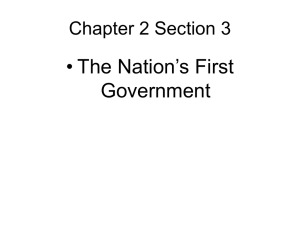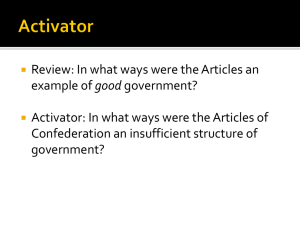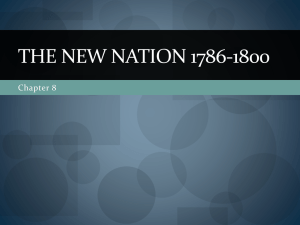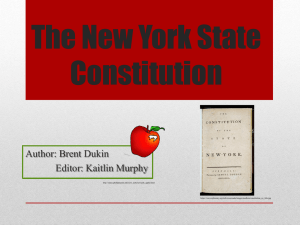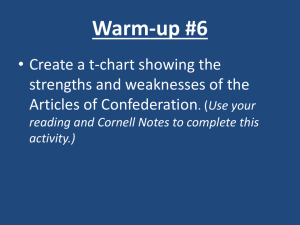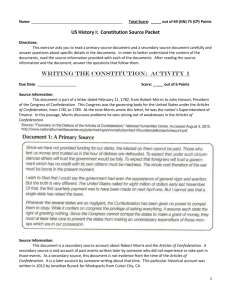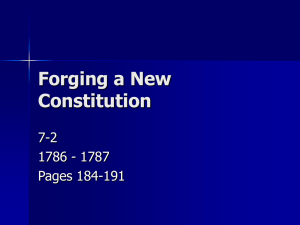Day Two PowerPoint: Constitutional Convention, Shays
advertisement
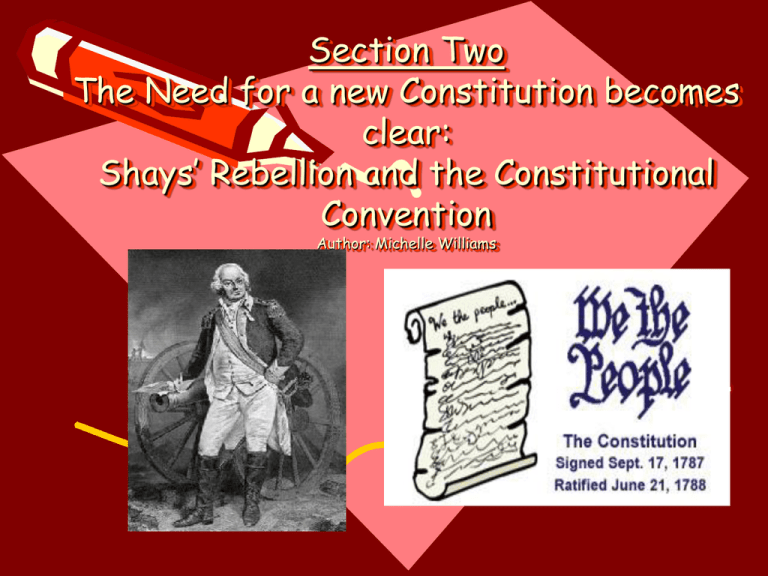
Section Two The Need for a new Constitution becomes clear: Shays’ Rebellion and the Constitutional Convention Author: Michelle Williams Section Two Summary • By the end of this section, you will… – Understand why there was a need for Constitutional reform – Know what important historical events contributed to the need for a new Constitution – Learn about the Constitutional Convention and the process of drafting a new constitution Why was there a need for Constitutional Reform? • Recap: What Problems did the Articles of Confederation fail to address??? Recap: Why the Articles were no longer working • • • • • • Little more than a “League of Friendship” Most power held by individual states Weak Central Government No way to tax No Judicial System States had trouble agreeing on just about anything!!! Shays’ Rebellion: The Need for Reform becomes Clear Shays’ Rebellion Shays’ Rebellion continued • Farmers rebel against the current Administration over their rights • Daniel Shays, former Revolutionary War hero, leads the revolt against the Massachusetts state government • Neither the national government or MA state government could gather enough troops to suppress the revolt The Effects of Shays’ Rebellion: the problems with the Articles could no longer be ignored • States feared revolts from their own citizens • The need for a stronger government clearer than ever before – National troops needed to be established – Tax reform critical – Central government must have more power! The Articles were clearly not working… What next??? • Founders could no longer ignore the failures of the Articles (Shays’ Rebellion!!!) • Founders hold the Constitutional Convention in Philadelphia in May 1787 • Initially intended to reform the Articles • Instead, a whole new document was written Delegates struggle to agree on a plan of government • The Challenge faced by delegates: Creating a government strong enough to preserve order without threatening personal liberty • Multiple Plans Proposed – The New Jersey Plan – The Virginia Plan – The “Great Compromise” aka the Connecticut Plan The New Jersey Plan • Proposed to just amend, not replace Articles • Benefited small states like Vermont, New Jersey, and Connecticut • One House Legislature • Congress chose house delegates The Virginia Plan • Used as the basic framework for the new constitution • Tried to appease both small and large states • National legislature would have supremacy over states • Small states still felt left out The Solution? The “Great Compromise” helps form the new constitution • The Great Compromise proposed a bicameral legislature to appease both small and large states • Senate: has equal representation – 2 senators per state (favors small states) • House of Representatives: based on state population (favors large states) Framework of the New Constitution • National government would have power to raise taxes, manage national armed forces, make court decisions, impose decisions and rules upon the states • Divided into three branches of government: Executive, Judicial, and Legislative • System of “Checks and Balances” instated to prevent any one branch from having too much power • States still have some power – political authority is divided between national government and state governments (known as “Federalism”) Summary of key concepts • Articles were failing miserably • Shays’ Rebellion pushed the need for reform • Founders struggled with how to appease both large and small states • The “Great Compromise” was their solution • The new government would have three branches with a system of checks and balances • States still had some power – (Federalism) Think Ahead… • What do you think is the most important problem addressed by the new Constitution? • Getting the states to approve the new constitution was not easy – what sort of problems do you envision the framers had in getting states to adopt their new form of government? Interactive notebook activity: Task: In your interactive notebooks, pretend that you are one of the delegates attending the Constitutional Convention. While at the convention, you are asked to give a speech about what you think are the most important issues that need to be addressed in the new Constitution. Write your speech in your notebooks. When finished, volunteers will present their speeches to the class. • • Scenario One: You are asked to be a delegate at the Constitutional Convention for the state of Vermont (a very small state.) When given your turn to speak, what sorts of problems and concerns do you want the new constitution to address? How can the new constitution ensure that small states will have a say? Scenario two: You are asked to be a delegate at the Constitutional Convention for the state of Virginia (a large state.) When given your turn to speak, what sorts of problems and concerns do you want the new constitution to address? How can the new constitution ensure that large states will be given enough representation to reflect their large population numbers? Resources • • • • http://www.shaysnet.com/dshays.html http://www.cyberlearning-world.com/nhhs/amrev/begin.htm http://plato.stanford.edu/entries/federalism/ Wilson, James Q. and DiIuLio, John J. American Government: The Essentials. Copyright 2001, Houghton Mifflin Company, Boston and New York, pps 22-36.
